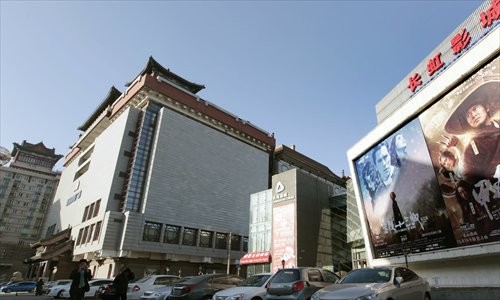
Business at Longfu Plaza (left) was down, and then dead, after a 1993 fire. Photo: CFP
Urban planners and cultural site protection experts yesterday raised objections toward a new government proposal to demolish Longfu Plaza, a closed-down shopping mall in Dongcheng district, for the restoration of a formerly popular cultural and commercial area.
Longfu Plaza, at Longfusi Jie, will be torn down to make way for the restoration and development of Longfu Temple area, one of the most popular commercial areas in Beijing before the 1990s, said Beijing People's Congress deputy Li Aiqing on Friday, who is also the chairman of Beijing State-owned Assets Management Company.
With an investment of more than 1 billion yuan, ($160 million) the plaza will be replaced by a reconstructed temple, and the surrounding area turned into a cultural and commercial district with centers for art trade, performing arts, cultural heritage display, leisure, and businesses, according to the draft plan.
"It's a complete waste of money. The government should put more money into protecting the existing hutong and cultural relics rather than an unrealistic reconstruction of an old commercial district," said Hua Xinmin, a cultural heritage protection expert in Beijing.
Longfu Temple used to be one of the most popular commercial areas in Beijing, together with Wangfujing, Xidan and Qianmen. The temple, to the west of Dongsibei Dajie, was built in the Ming Dynasty (1368-1644), and was a residence of Lamas and monks. Longfu Plaza was built in 1988 and closed in 2004, losing its struggle to survive after an extensive fire in 1993.
The area was filled with vendors selling daily products including clothing, books and food, said a local urban planner who insisted on anonymity.
"It's difficult to recreate it, not when the capital has so many shopping centers. Running modern businesses with an ancient face will never work, just like in Qianmen," she said.
Li, a deputy in the city's National People's Congress, told the Global Times yesterday the company is working on details of the plan with the district government, but it does not involve demolition of nearby courtyard houses, hutong or relocation of residents.
"The so-called experts are scaremongering, criticizing the plan like this," Li said, "How could they know we'll follow Qianmen's mistake with the plan not worked out yet?"
The plan is to revive the former popular area and combine traditional and modern elements, he explained, and the company will seek opinions from both experts and residents.
"My business has been going down since the fire, and I'd love to see the area developed into a big cultural district," said an employee with China Bookstore on Longfusi Jie, surnamed Liu. But the area will never revive, he said, "If the government focuses too much on business opportunities and tries to turn it into a lifeless tourist site."

Copyright ©1999-2011 Chinanews.com. All rights reserved.
Reproduction in whole or in part without permission is prohibited.